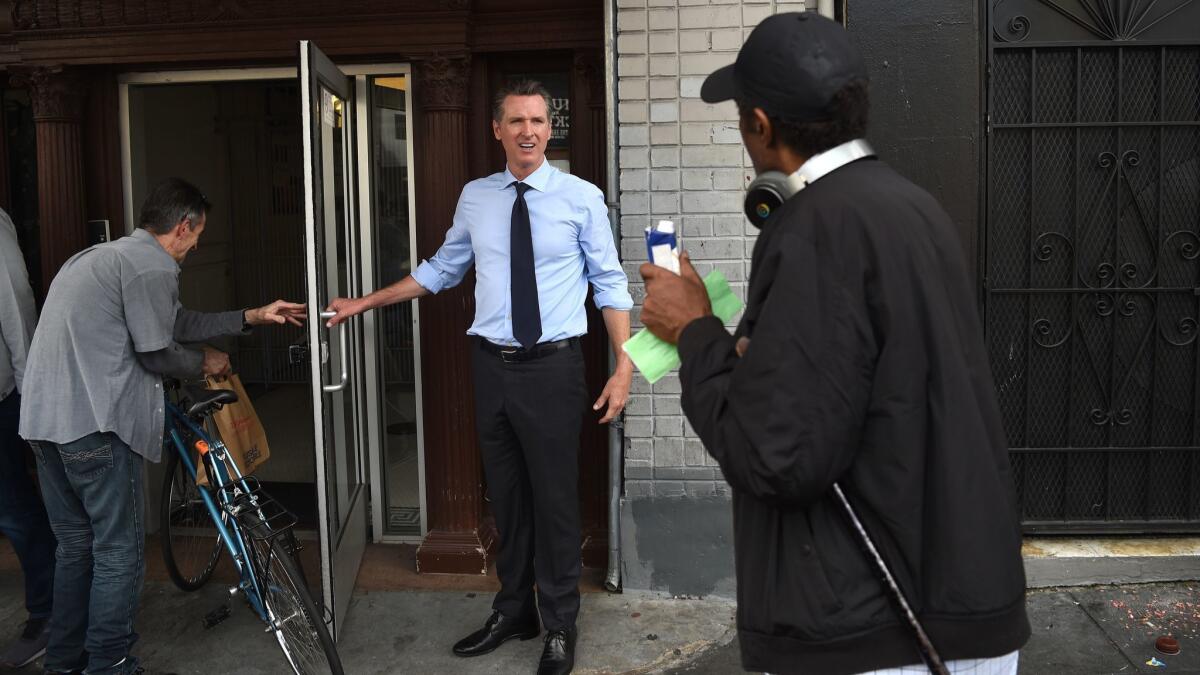Editorial: Gavin Newsom goes big on housing. Will California NIMBYs play along?

When Gov. Gavin Newsom said he wasn’t going to play “small ball” on the state’s housing crisis, he wasn’t kidding.
On his fourth day on the job, Newsom offered a budget that includes an additional $2.3 billion to build more housing for low-income and homeless Californians and to help cities rezone and streamline approvals to speed up housing development. He paired that with a proposal to radically overhaul the state’s housing strategy, including a controversial proposal to withhold transportation dollars from communities that fail to build enough homes to meet their needs.
For decades, California’s “fair share” housing law has required cities and counties to produce lengthy reports explaining how and where they could accommodate both the affordable and market-rate development needed to house their share of an ever-growing state population. Few cities meet the goals they set for themselves, however. There have been recent legislative efforts to put teeth behind the law but nothing on the scale of what Newsom has proposed.
Housing and transportation are inextricably linked, Newsom argued. “If you’re not hitting your goals, I don’t know why you get the money.”
It’s essential that California turn the corner on its housing crisis. Newsom gets credit for coming out and swinging for the fences.
Newsom is right about the need for dramatic action on the state’s debilitating housing woes. The housing shortage is the root of so many of California’s most pressing problems: Homelessness, poverty, uneven economic development, freeways clogged with commuters and pollution from vehicles.
California has the nation’s highest poverty rate when housing costs are factored in. The lack of available and affordable units is driving an epidemic of homelessness. When residents cannot afford to live near jobs, they often move to far-flung suburbs and commute hours each day, worsening traffic congestion and air pollution. Employers say high housing costs also hurt the state’s economy by making it hard to attract and retain skilled workers — a problem that has led some companies to relocate to states where their middle-class workers can afford to buy homes.
And for all its ambitious plans to combat climate change, California is moving far too sluggishly to build the kinds of dense, walkable, bikeable, transit-friendly communities that will reduce driving and cut greenhouse gas emissions to help slow global warming.
The reality is that California’s housing, transportation and climate change goals are all linked, and funding should be too. Especially now. While Newsom focused primarily on using transportation funding to induce more housing-friendly policies, California has several large funding streams that could, potentially, be used as a carrot or a stick for local governments.
The Senate Bill 1 gas tax and vehicle fee increases passed in 2017 will generate $5 billion a year for transportation. While much of that money is earmarked for road and infrastructure repairs, there will be many millions of dollars awarded through competitive grants, and state leaders could include housing production as a factor in deciding which cities get the money.
The state also has billions of dollars to fund affordable housing projects, thanks to the $4-billion housing bond approved in November and a real estate transaction fee approved last year. Plus there is a multimillion dollar pot of money from the state’s cap-and-trade program that’s dedicated to transportation and housing development.
Enter the Fray: First takes on the news of the minute from L.A. Times Opinion »
It’s not clear at this point how much authority Newsom has to use those dollars as incentives to build the kind of housing the state desperately needs. But to whatever extent the law allows, California should be using that money to prod cities to approve new market-rate and affordable housing faster and in greater quantity, particularly in areas near transit centers and workplaces.
Of course, doing so will be extremely difficult — both technically and politically.
Before the state could add serious penalties for failing to meet their local “fair share” housing targets, Newsom and lawmakers would need to come up with an equitable way to set the goals and evaluate why cities fail to meet them. Sometimes cities don’t produce enough housing because of unnecessary red tape and NIMBYism. Sometimes it’s because developers can’t get financing or the cost of labor and materials are too high to make projects pencil out.
Much of what Newsom is proposing still has to be vetted and approved by the Legislature. That’s no sure thing. The politics of land use are never easy, as cities and counties do not want to give up local control over development decisions. But it’s essential that California turn the corner on its housing crisis. Newsom gets credit for coming out and swinging for the fences.
Follow the Opinion section on Twitter @latimesopinion and Facebook
More to Read
A cure for the common opinion
Get thought-provoking perspectives with our weekly newsletter.
You may occasionally receive promotional content from the Los Angeles Times.










